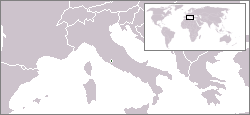Prisoners in the Vatican
| States of the Church | ||||||||||||
| Stati della Chiesa | ||||||||||||
|
||||||||||||
|
Flag
|
||||||||||||
| Capital | Vatican City | |||||||||||
| Languages | Latin, Italian | |||||||||||
| Religion | Roman Catholic | |||||||||||
| Government | Theocracy | |||||||||||
| Pope | ||||||||||||
| • | 1870–1878 | Pius IX (Pope since 1846) | ||||||||||
| • | 1878–1903 | Leo XIII | ||||||||||
| • | 1903–1914 | St Pius X | ||||||||||
| • | 1914–1922 | Benedict XV | ||||||||||
| • | 1922–1929 | Pius XI (Pope until 1939) | ||||||||||
| History | ||||||||||||
| • | Capture of Rome | 20 September 1870 | ||||||||||
| • | Lateran Treaty | 11 February 1929 | ||||||||||
|
||||||||||||
A prisoner in the Vatican or prisoner of the Vatican (Italian: Prigioniero del Vaticano; Latin: Captivus Vaticani) is how Pope Pius IX was described following the capture of Rome by the armed forces of the Kingdom of Italy on 20 September 1870. Part of the process of Italian unification, the city's capture ended the millennial temporal rule of the popes over central Italy and allowed Rome to be designated the capital of the new nation. The appellation is also applied to Pius's successors through Pope Pius XI.
As nationalism swept the Italian Peninsula in the 19th century, efforts to unify Italy were blocked in part by the Papal States, which ran through the middle of the peninsula and included the ancient capital of Rome. The Papal States were able to fend off efforts to conquer them largely through the pope's influence over the leaders of stronger European powers such as France and Austria. When Rome was eventually taken, the Italian government reportedly intended to let the pope keep the part of Rome west of the Tiber called the Leonine City as a small remaining Papal State, but Pius IX refused. One week after entering Rome, the Italian troops had taken the entire city save for the Apostolic Palace; the inhabitants of the city then voted to join Italy.
For the next 59 years, the popes refused to leave the Vatican in order to avoid any appearance of accepting the authority wielded by the Italian government over Rome as a whole. During this period, popes also refused to appear at Saint Peter's Square or at the balcony of the Vatican Basilica facing it, as the square in front of the Basilica was occupied by Italian troops. During this period, popes granted the Urbi et Orbi blessings from a balcony facing a courtyard, or from inside the Basilica, and Papal Coronations were instead held at the Sistine Chapel. The period ended in 1929, when the Lateran Treaty created the modern state of Vatican City.
...
Wikipedia


